Emergency HVAC Church Gresley
Top 10 After Hours HVAC in Church Gresley
Get up to 3 After Hours HVAC quotes for your project today! Compare profiles, reviews, accreditations, portfolio, etc... and choose the best offer.

TitanFlameltd-Glossop
51 reviews175 High St W, Glossop, SK13 8HJ, GBTitan Flameltd is a local plumbing emergency call out service with over 20 years of experience in plumbing and heating. We strive to complete every job with the highest skill and best customer service. Our team of emergency plumbers and heating engineers are available 24/7 to provide fast, reliable solutions. We offer a range of services including appliance installation, bathroom plumbing, emergency plumbing, immersion heaters, kitchen plumbing, outdoor plumbing, tap repair and install, pipe repair, boiler installation and repair, water heater installation and repair, radiator installation and repair, gas line installation and repair, furnace installation and repair, heat pump installation and repair, drain cleaning, plumbing repairs, pipe installation and repair, water treatment, and sewer line repair and replacement. We are available 24/7 and offer quick appointments, fast, efficient services, and expert support when you need it most.
- Services
- Why Us?
- Gallery
Get Quote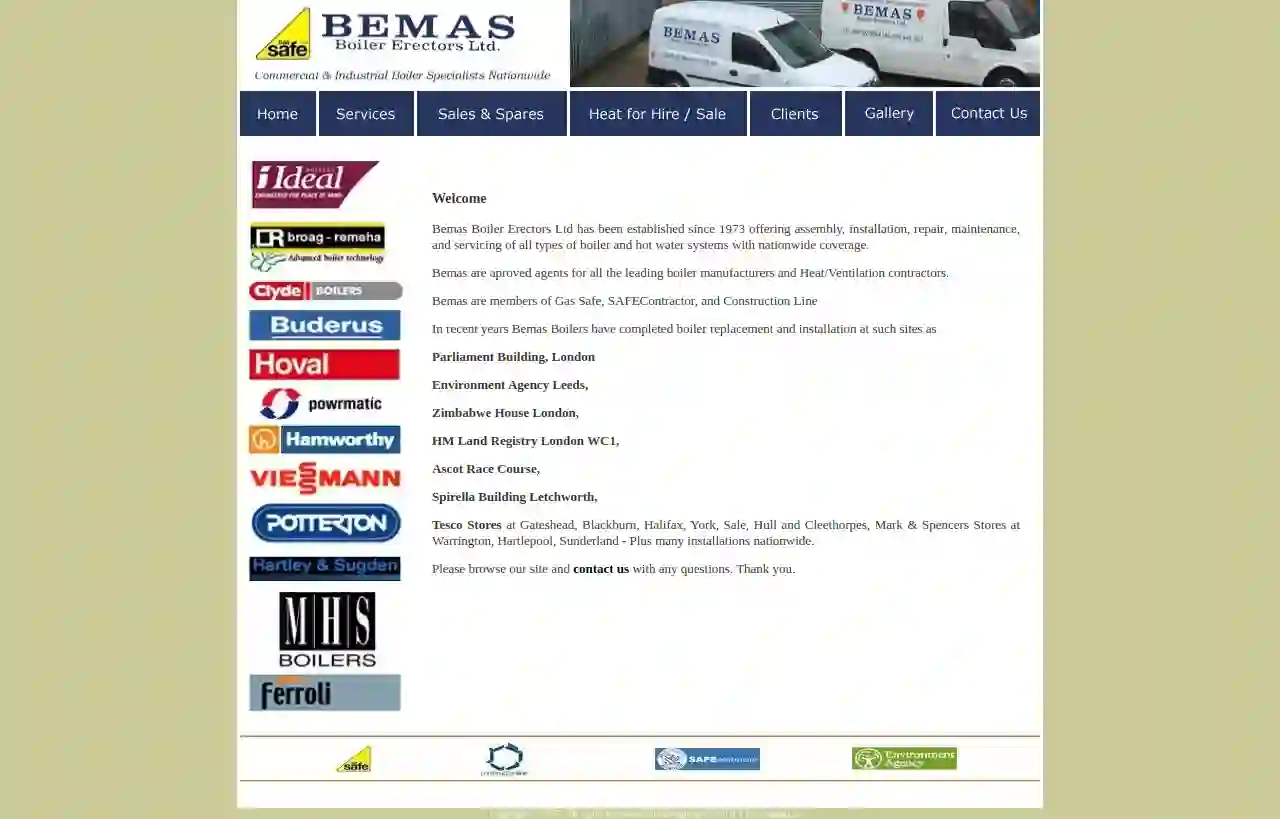
Bemas Boilers Ltd
Cilfton Avenue, Long Eaton, NG10 2GA, GBBemas Boiler Erectors Ltd has been established since 1973 offering assembly, installation, repair, maintenance, and servicing of all types of boiler and hot water systems with nationwide coverage. Bemas are approved agents for all the leading boiler manufacturers and Heat/Ventilation contractors. Bemas are members of Gas Safe, SAFEContractor, and Construction Line. In recent years Bemas Boilers have completed boiler replacement and installation at such sites as Parliament Building, London, Environment Agency Leeds, Zimbabwe House London, HM Land Registry London WC1, Ascot Race Course, Spirella Building Letchworth, Tesco Stores at Gateshead, Blackburn, Halifax, York, Sale, Hull and Cleethorpes, Mark & Spencers Stores at Warrington, Hartlepool, Sunderland - Plus many installations nationwide. Please browse our site and contact us with any questions. Thank you.
- Services
- Why Us?
- Gallery
Get Quote
Complete Cooling Services Ltd
524 reviewsUnit 4a, Huss's Lane, Long Eaton, NG10 1G, GBComplete Cooling Services is a local HVAC engineers company providing the best services for heating, ventilation & air conditioning. With over 107 years of combined industry experience and knowledge, our team of highly trained and skilled HVAC engineers deliver exceptional services. We provide a seamless and reliable service when it comes to your HVAC systems installation, maintenance and repairs. Our services include air conditioning installation, repairs, service & maintenance, planned preventative maintenance, and more. We are a local company dedicated to ensuring that all of our customers get the very best service and support when it comes to their air conditioning and comfort cooling requirements.
- Services
- Why Us?
- Our Team
- Gallery
Get Quote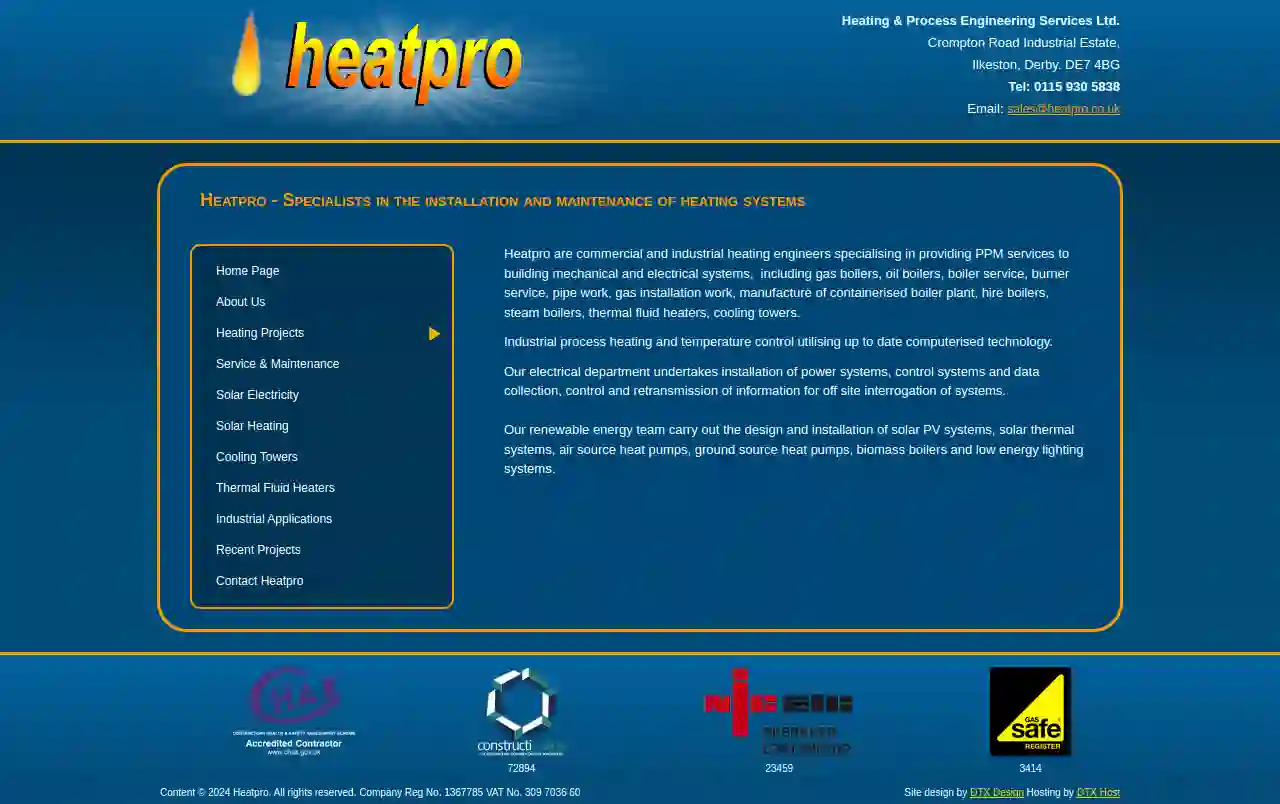
Heating & Process Engineering Services Ltd
44 reviewsIlkeston, Derby, Crompton Road Industrial Estate, DE7 4BG, GBHeating & Process Engineering Services Ltd. is a company that specialises in providing PPM services to building mechanical and electrical systems, including gas boilers, oil boilers, boiler service, burner service, pipe work, gas installation work, manufacture of containerised boiler plant, hire boilers, steam boilers, thermal fluid heaters, cooling towers. We also provide industrial process heating and temperature control utilising up to date computerised technology. Our electrical department undertakes installation of power systems, control systems and data collection, control and retransmission of information for off site interrogation of systems. Our renewable energy team carry out the design and installation of solar PV systems, solar thermal systems, air source heat pumps, ground source heat pumps, biomass boilers and low energy lighting systems.
- Services
- Why Us?
- Gallery
Get Quote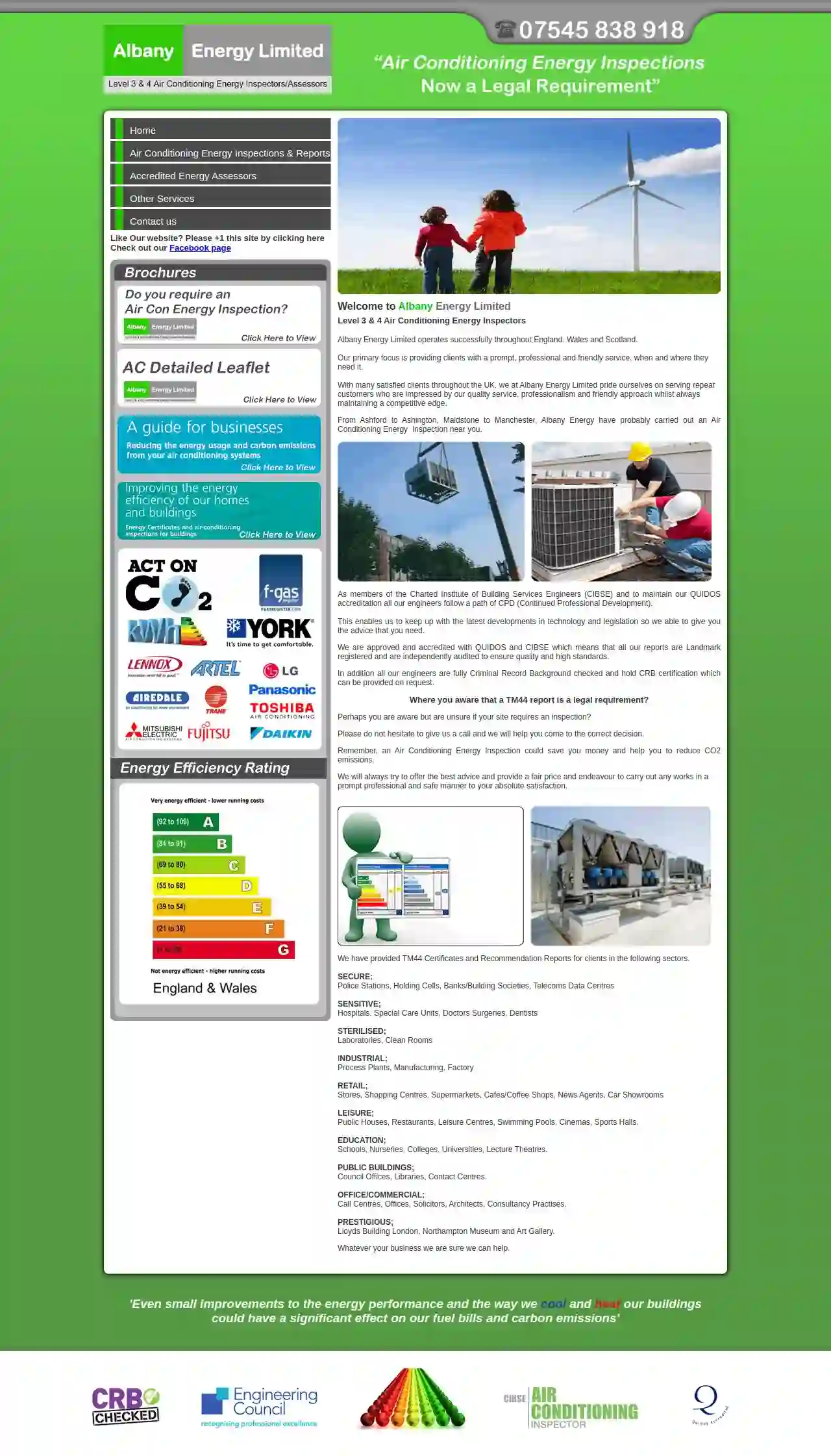
Albany Energy Limited (TM44 Air Con AC Energy Inspections)
Ilkeston, GBWelcome to Albany Energy Limited, Level 3 & 4 Air Conditioning Energy Inspectors. We operate successfully throughout England, Wales and Scotland. Our primary focus is providing clients with a prompt, professional and friendly service, when and where they need it. With many satisfied clients throughout the UK, we at Albany Energy Limited pride ourselves on serving repeat customers who are impressed by our quality service, professionalism and friendly approach whilst always maintaining a competitive edge. From Ashford to Ashington, Maidstone to Manchester, Albany Energy have probably carried out an Air Conditioning Energy Inspection near you. As members of the Charted Institute of Building Services Engineers (CIBSE) and to maintain our QUIDOS accreditation all our engineers follow a path of CPD (Continued Professional Development). This enables us to keep up with the latest developments in technology and legislation so we are able to give you the advice that you need. We are approved and accredited with QUIDOS and CIBSE which means that all our reports are Landmark registered and are independently audited to ensure quality and high standards. In addition all our engineers are fully Criminal Record Background checked and hold CRB certification which can be provided on request. Where you aware that a TM44 report is a legal requirement? Perhaps you are aware but are unsure if your site requires an inspection? Please do not hesitate to give us a call and we will help you come to the correct decision. Remember, an Air Conditioning Energy Inspection could save you money and help you to reduce CO2 emissions. We will always try to offer the best advice and provide a fair price and endeavour to carry out any works in a prompt professional and safe manner to your absolute satisfaction.
- Services
- Why Us?
- Accreditations
- Our Team
- Gallery
Get Quote
GasTech/CoolTech - Plumbing, Heating, Gas, Air Conditioning & ASHP Services Ltd
512 reviewsMidway, 12 Copse Rise, Swadlincote, DE11 7NG, GBAt GasTech/CoolTech, we are experts in gas, heating, and plumbing installation, boiler maintenance/service, and breakdown. We offer air conditioning and air source heat pump installation. We pride ourselves on the highest possible standards of workmanship and customer satisfaction. We are friendly, experienced, fully qualified, insured, and registered with Gas Safe (formerly known as CORGI). We are fairly priced and offer fixed prices on other jobs such as boiler installs or bathroom installations. We are always up front in all our pricing so you know we are a company you can trust. We offer a call out service for emergency boiler breakdowns, gas leak detection, water leaks, etc. We look forward to hearing from you soon and thank you for visiting. Please feel free to check us out on Facebook. There are many more examples on our Facebook page at https://www.facebook.com/GasTechLJ COMPANY GAS SAFE NUMBER 634228 COMPANY FGAS NUMBER FGAS-3013578
- Services
- Why Us?
- Accreditations
- Our Team
- Gallery
Get Quote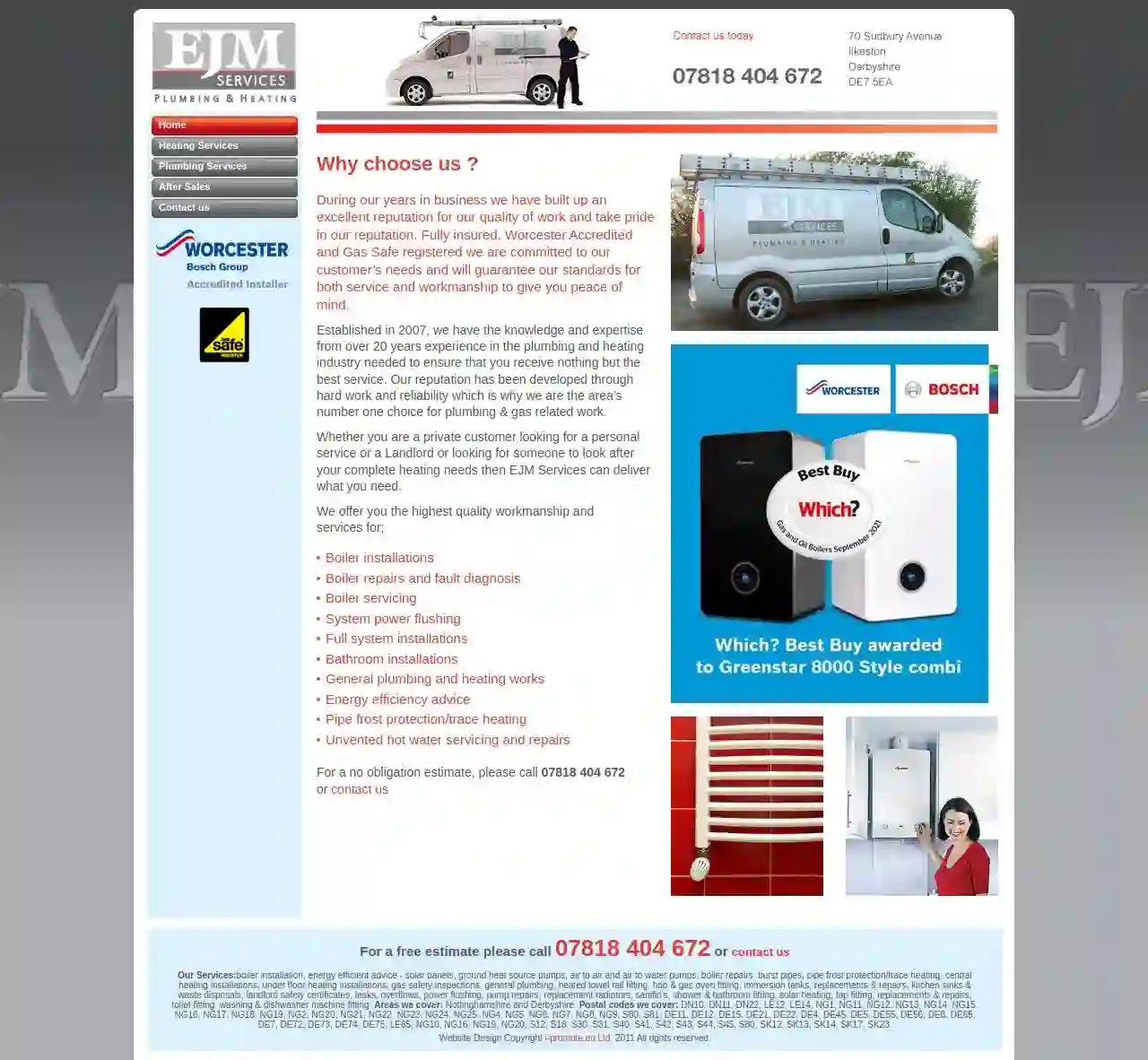
EJM Services
52 reviews70 Sudbury Avenue., Ilkeston, DE7 5EA, GBDuring our years in business we have built up an excellent reputation for our quality of work and take pride in our reputation. Fully insured, Worcester Accredited and Gas Safe registered we are committed to our customer’s needs and will guarantee our standards for both service and workmanship to give you peace of mind. Established in 2007, we have the knowledge and expertise from over 20 years experience in the plumbing and heating industry needed to ensure that you receive nothing but the best service. Our reputation has been developed through hard work and reliability which is why we are the area’s number one choice for plumbing & gas related work. Whether you are a private customer looking for a personal service or a Landlord or looking for someone to look after your complete heating needs then EJM Services can deliver what you need.
- Services
- Why Us?
- Accreditations
- Gallery
Get Quote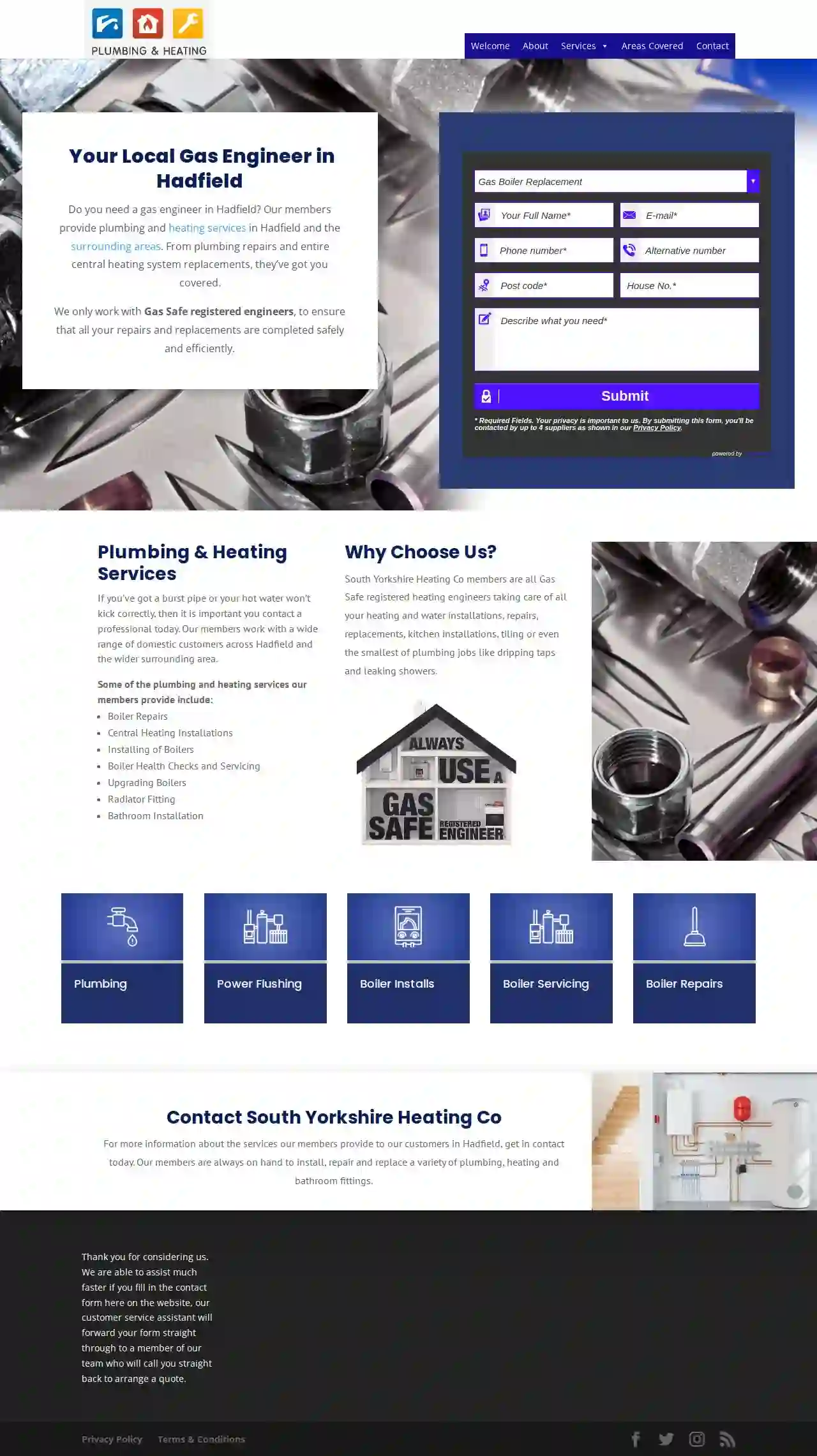
MWF HEATING SERVICES LTD
54 reviewsUnit 1, 100-102, Sheffield Road, Hadfield, S20 1AA, GBSouth Yorkshire Heating Co connects you with Gas Safe registered heating engineers across South Yorkshire and the surrounding areas. Whether you need a plumber or a heating engineer, our members are here to help with all your plumbing and heating needs, from small repairs to complete system replacements. They provide a wide range of services, including boiler installations, repairs, servicing, power flushing, smart thermostat installations, and more. For peace of mind, all our members are fully qualified and insured, ensuring your work is completed safely and efficiently.
- Services
- Why Us?
- Gallery
Get Quote
Trane UK
51 reviewsSwadlincote, GBTrane is a leading global provider of indoor comfort solutions and services. Our innovative products and services help buildings and processes work more efficiently, sustainably, and effectively. With a portfolio of energy-efficient HVAC systems, rental solutions, and services, we help customers achieve their goals and reduce their environmental impact. Our solutions are designed to meet the unique needs of various industries, including office buildings, data centers, healthcare, hospitality, chemicals and pharmaceuticals, retail, food and beverage, and district heating and cooling.
- Services
- Why Us?
- Gallery
Get Quote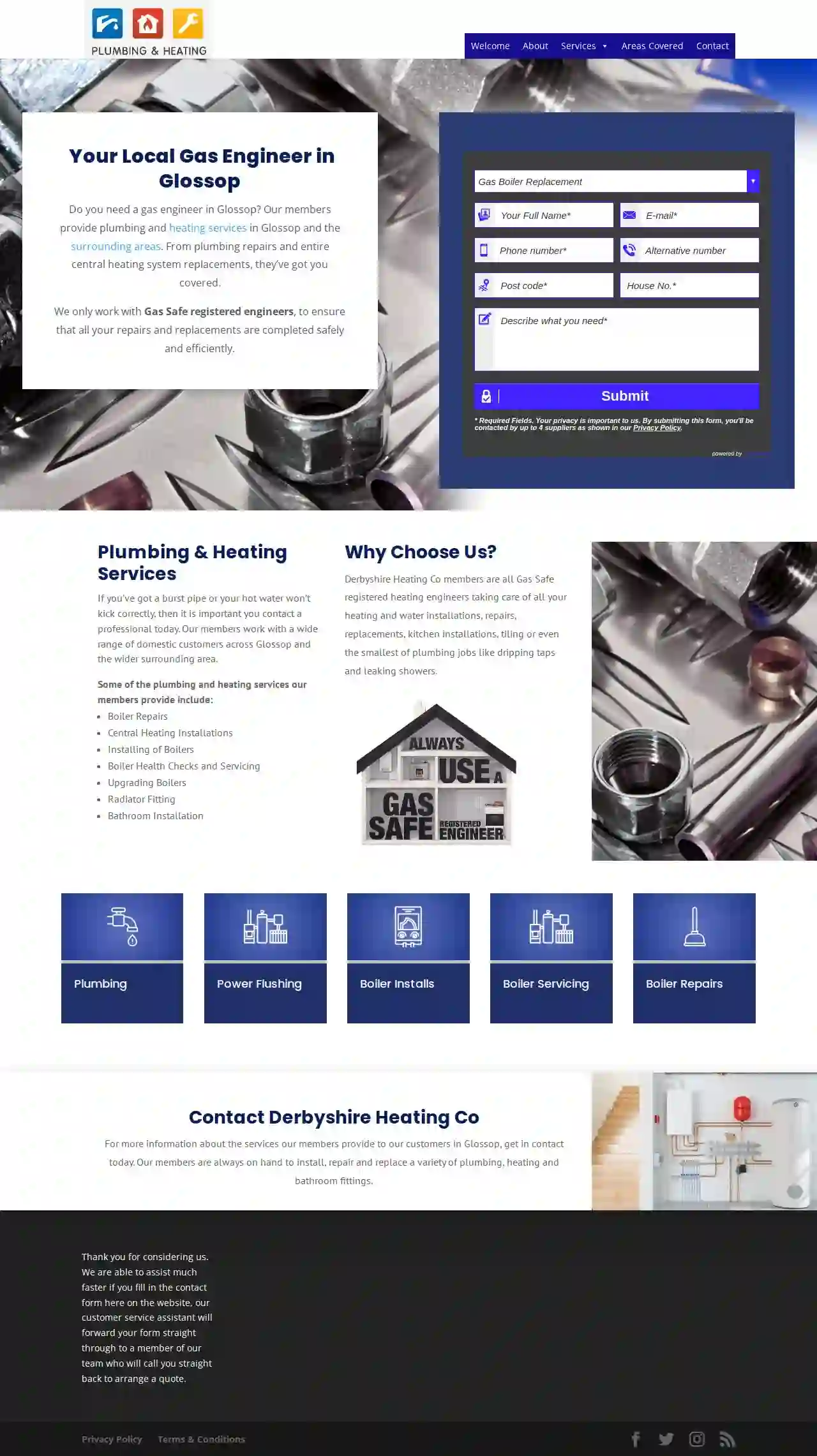
Gas Safe UK
Unit 1, 10-12, The Old Mill, Glossop, DE1 1AA, GBDerbyshire Heating Co connects you with Gas Safe registered heating engineers across Derbyshire and the surrounding areas. Whether you need a plumber, boiler installation, repairs, or servicing, our members are here to help. They handle everything from burst pipes and hot water issues to full central heating system replacements, kitchen installations, tiling, and even small jobs like dripping taps. Contact Derbyshire Heating Co today for a quote and experience reliable, efficient service from trusted professionals.
- Services
- Why Us?
- Accreditations
- Gallery
Get Quote
Over 12,692+ HVAC Contractors on our platform
Our HVAC companies operate in Church Gresley & surrounding areas!
HVACCompaniesHub has curated and vetted the Best HVAC Companies arround Church Gresley. Find a top & trustworthy pro today.
Frequently Asked Questions About Emergency HVAC Services
- Lower Your Thermostat: Set your thermostat to a lower temperature when you are away or asleep. Consider installing a smart thermostat for precise temperature control.
- Seal Air Leaks: Seal gaps and cracks around windows, doors, and other openings to prevent heat loss.
- Improve Insulation: Make sure your home is properly insulated.
- Annual Furnace Maintenance: Keep your furnace running efficiently with annual inspections and tune-ups.
- Use Window Coverings: Close curtains or blinds at night to retain heat.
- Control Humidity: Keep indoor humidity levels between 30% and 50%.
- Regularly Change Air Filters: Change your air filters frequently.
- Clean Drip Pans and Condensate Drains: Regularly inspect and clean your AC unit's drip pans and condensate drains to prevent standing water.
- Ensure Proper Ventilation: Adequate ventilation helps to control humidity levels.
- Schedule Professional Duct Cleaning: Have your ducts professionally cleaned every few years to remove mold and other contaminants.
- Raise Your Thermostat: Set your thermostat to a higher temperature when you’re away. Consider using a programmable or smart thermostat.
- Use Fans: Fans can circulate air and make you feel cooler, allowing you to raise the thermostat a few degrees.
- Close Window Coverings: Keep curtains or blinds closed during the day to block out sunlight.
- Limit Heat-Generating Activities: Avoid running heat-producing appliances (ovens, dryers) during the hottest parts of the day.
- Annual AC Maintenance: Schedule yearly maintenance for your air conditioner to ensure it's running efficiently.
- Plant Shade Trees: Planting trees around your home can provide natural shade and reduce heat gain.
What is the best way to heat my home efficiently?
What is a humidifier, and should I use one with my HVAC system?
How can I prevent mold in my HVAC system?
How can I cool my home efficiently?
What is the best way to heat my home efficiently?
- Lower Your Thermostat: Set your thermostat to a lower temperature when you are away or asleep. Programmable thermostats automate this process, helping you save money.
- Seal Air Leaks: Seal gaps and cracks around windows, doors, and other openings to prevent heat loss.
- Improve Insulation: Make sure your home is properly insulated.
- Annual Furnace Maintenance: Keep your furnace running efficiently with annual inspections and tune-ups.
- Use Window Coverings: Close curtains or blinds at night to retain heat.
What is a humidifier, and should I use one with my HVAC system?
How can I prevent mold in my HVAC system?
- Control Humidity: Keep indoor humidity levels between 30% and 50%.
- Regularly Change Air Filters: Change your air filters frequently.
- Clean Drip Pans and Condensate Drains: Regularly inspect and clean your AC unit's drip pans and condensate drains to prevent standing water.
- Ensure Proper Ventilation: Adequate ventilation helps to reduce moisture buildup.
- Schedule Professional Duct Cleaning: Have your ducts professionally cleaned every few years to improve indoor air quality.
How can I cool my home efficiently?
- Raise Your Thermostat: Set your thermostat to a higher temperature when you’re away. Consider using a programmable or smart thermostat.
- Use Fans: Fans can circulate air and make you feel cooler, even at a higher thermostat setting.
- Close Window Coverings: Keep curtains or blinds closed during the day to block out sunlight.
- Limit Heat-Generating Activities: Avoid running heat-producing appliances (ovens, dryers) during the hottest parts of the day.
- Annual AC Maintenance: Schedule yearly maintenance for your air conditioner to ensure it's running efficiently.
- Plant Shade Trees: Planting trees around your home can provide natural shade and reduce heat gain.